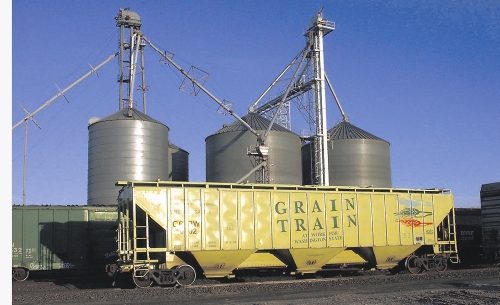forum
library
tutorial
contact

Grain Train Welcomes 29 More Cars
by Matthew WeaverCapital Press, January 6, 2011
|
the film forum library tutorial contact |

|
Grain Train Welcomes 29 More Cars
by Matthew WeaverCapital Press, January 6, 2011 |
State program sets aside rail cars for grain shipments
 Industry representatives recently welcomed the addition of 29 grain hopper cars to Washington state's Grain Train program.
Industry representatives recently welcomed the addition of 29 grain hopper cars to Washington state's Grain Train program.
The rail cars transport grain grown in Eastern Washington to ports along the Columbia River and Puget Sound. From there, the grain is loaded onto ships bound for markets on the Pacific Rim, according to the Washington State Department of Transportation.
Mike Rowswell, project manager for the department's rail and marine division, said the additional cars, which were purchased used, provide assurance that farmers will be able to get their grain to market.
Car shortages are hard to predict, Rowswell said, and depend on the quantity of grain in the Midwest and other parts of the world.
The program is at least 12 years old, Rowswell said.
The $362,500 purchase brings the total number of cars in the program to 118. Most are owned by Washington state, Rowswell said, and 18 are owned by the Port of Walla Walla.
The program is self-sustaining, with no taxpayer dollars used to pay for cars or their use. User fees fund the program and the purchase of cars.
Kevin Whitehall, CEO of Central Washington Grain Growers in Waterville, Wash., said the additional cars help all shippers.
"It gives us access to an additional 29 cars that we do not have to go out and try to bid for or get in an auction," he said. Beau Duff, assistant manager of Whitgro Inc., of St. John, Wash., said the program helps keep freight rates low.
Whitgro will likely not be affected by the new cars, which will be used by companies on the northern lines, Duff said. Whitgro uses a shuttle to Northwest Grain Growers in Wallula, Wash., where the company will store grain until the Columbia and Snake river lock system reopens in March.
The new cars collect grain between Coulee City, Wash., and Cheney, Wash., and carry it to Ritzville on the state-owned Palouse River and Coulee City rail system for transport to the coast for export, according to a department press release.
Duff said there haven't been any major rail car shortages in the wake of the river closure.
All rail shippers geared up prior to the closure, Whitehall said. His company prepared beforehand, and plans to ship more by rail than usual during the river closure.
The department will review the entire program during the next six to 10 months, Rowswell said.
"That will tell us where we need to go, how we can make it better," he said, noting the state's budget situation does not play a part in the examination.
Related Pages:
The Washington Grain Train by Ray Allred, WA State DOT Brochure, October 2003
learn more on topics covered in the film
see the video
read the script
learn the songs
discussion forum
